
8 minute read
THE BATTLE AGAINST DISINFORMATION
NAVIGATING TRUTH IN THE DIGITAL AGE
How Trent University and alumni are helping tackle the spread of false information and restoring trust in public institutions, journalism, and democracy.
In an age where information is instantly accessible and can easily traverse international borders, the rise of disinformation has emerged as a grave global threat. The intentional dissemination of false or misleading content has become a potent weapon, capable of shaping public opinion, destabilizing democratic processes, and eroding trust in both public institutions and the media.
From social media platforms to independent websites and blogs, there are many new and emerging channels to spread false information, making it increasingly difficult to discern fact from fiction. The consequences are far-reaching and impact almost every area of our lives, including public health, the economy, social cohesion, and political stability.
Trent University is helping tackle this issue. Through its interdisciplinary focus, distinctive collegiate system, impactful initiatives, innovative programs, and longstanding commitment to critical thinking, Trent is helping to combat disinformation and helping restore trust in public institutions, journalism, and democracy itself. Trent’s foremost initiative in this regard has been launching the endowed Jarislowsky Chair in Trust & Political Leadership. As Trent’s Jarislowsky chair, Dr. Cristine de Clercy has become a national leader in addressing this alarming issue through a democracy lens.
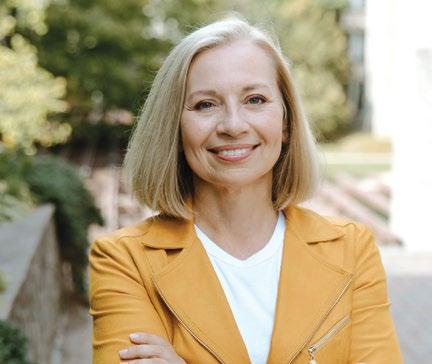
“The denigration of truth and power of rumour are terribly powerful factors in the fight for good information,” Professor de Clercy says. “When people don’t know who to trust or what to believe, it has worrying effects for the nature and quality of democracy itself.”
Disinformation is Nothing New
Disinformation has always existed, Prof. de Clercy adds, but technology has made it much easier to spread bad information quickly. Most democratic countries around the world are currently grappling with a rising number of problems from this issue.
In Canada, she says disinformation has affected academics, public watchdogs, political parties, and, perhaps most troublingly, Elections Canada—the government body tasked with ensuring free and fair elections. This situation helped prompt the establishment of Canada’s Public Inquiry into Foreign Interference in Federal Electoral Processes and Democratic Institutions in 2023. The Commission investigates foreign interference by countries like China and Russia in Canada’s 2019 and 2021 federal elections, and works to assess and enhance the nation’s ability to detect and counter these threats. Its findings and recommendations are expected to significantly influenc Canada’s policies on electoral integrity and national security.
Although Canada is not the only country facing this issue, Prof. de Clercy highlights that the nation is relatively protected from the most severe instances of political disinformation, thanks in part to stringent campaign finance regulations and Elections Canada’s comprehensive policies and procedures.
As countries worldwide continue to navigate the complexity of truth in what some call the “post-truth era,” Prof. de Clercy says the University remains committed to preparing the next generation of leaders through its core teaching principles: fostering critical thinking, encouraging logical reasoning, and promoting diverse information sources.
“These are classical academic skills, but they now have a new salience,” Prof. de Clercy adds.
Trent also has a long and storied history of training future leaders in myriad fields through its distinctive collegiate system that enhances a sense of community, adds Dr. Mark Skinner, dean of Humanities & Social Sciences.
“Polarization and mistrust grow in isolation, and our students benefit as future leaders from interaction with each other and with professors through our tightknit college communities,” he says.
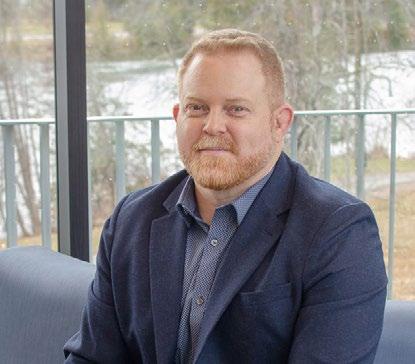
Trent has adapted to this new era by innovatively creating courses and events specifically designed to address disinformation and polarization. For instance, Professor Skinner notes that the Philosophy Department offers a course on analyzing conspiracy theories and organizes the annual Groarke Debates, providing students with the opportunity to engage with differing expert perspectives and opinions.
Trent’s Media Studies Program also expanded its offerings in recent years and cross-lists courses with Computer Science on the effects of the digital world in our culture. The University’s new degree program in Human Rights & Global Justice offers academic learning on building trustworthy institutions and laws. Trent is also implementing a degree program in Artificial Intelligence (AI) at Trent University Durham GTA in 2025, adds Dr. Kathryn Norlock, associate dean (Academic), Humanities & Social Sciences at Trent University. She says the program is deliberately interdisciplinary so that students gain both technological skills and a complex understanding of the ethical, political, and social impacts of AI.
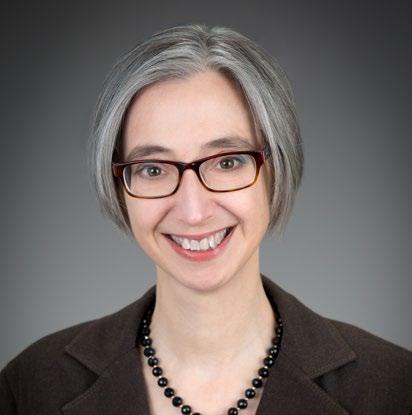
“What a CBC commentator recently called ‘the golden age of fraud’ is made more challenging by the rise of forms of AI that make public trust more difficult because people wonder if what they read or see online is real,” Professor Norlock says. “Our AI degree students will be the next leaders in responsible AI development and regulation.”
Well-Funded Journalism More Important than Ever
With the meteoric rise of digital media fueling disinformation, solid journalism is more important than ever, adds Max Leighton ’06 (Champlain College), a CBC Radio current affairs producer.
“We’re living through several intersecting events at the moment, including the rise of digital media and slow death of traditional media, which make it harder for journalists to create good journalism and harder for the public to trust the information that they are getting is verifiable,” he says.
“The current digital media landscape creates fertile ground for disinformation including conspiracy theories, pseudoscience, and intentional disinformation campaigns by hostile foreign governments and other bad actors.”
Leighton argues that authoritarian leaders around the world often see the free press as an enemy and benefit greatly from the doubt and division created by an information vacuum.
“As a reporter, it’s also much harder to counter disinformation with straight fact-checking, because, for some, expertise itself is suspect and ‘mainstream media’ all the more so,” he adds.
To help address the issue, Leighton has worked with Journalists for Human Rights on the Fighting Disinformation Project. Led by investigative reporter Craig Silverman, a disinformation expert who works for ProPublica, the project trains Canadian journalists in digital investigation skills like tools for opensource digital investigation, reporting techniques, and methods to use online search engines to help verify digital content. After receiving the training himself, Leighton provided the same tools to reporters from the Canadian Press, CBC, and National Post.
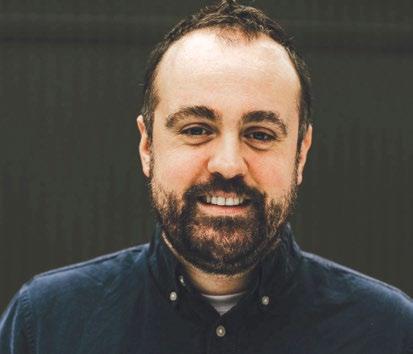
“I think disinformation thrives wherever people don’t have the tools or the wherewithal to counter it,” he adds.
“We know disinformation drives wedges into fissures that already exist in our societies, but I think the most concerning thing is how effective it has been at exploiting those divisions. So, I think each of us has a role to play in fighting it—with facts, and also with humility and kindness.”
To keep debunking fake news and exposing disinformation, Leighton adds that society requires employed journalists in well-funded newsrooms.
“I think we should all have at least one paid news subscription,” he says. “I suggest finding out which media outlet is doing the most good in your community—who is doing meaningful, diligent, accurate, responsible journalism that benefits you and the people you care about—and subscribe to that. If that happens to be your local paper, buy your mom a subscription too.”
Dr. Amanda Paxton, an assistant English professor at Trent Durham GTA who serves as coordinator of the Journalism and Creative Writing (JCW) Program, agrees that the value of journalism is more important than ever because it is fact-based and considers broader social and political contexts in framing its analysis.
“An informed public is the backbone of a functioning democracy, and its starting point is trusted sources of information,” she says.
The JCW Program guides students in critically examining controversies around news and social media content as well as research into issues like media echo chambers. Throughout the interdisciplinary liberal arts courses, she says students hone critical thinking skills that allow them to take an informed perspective on information and media. “The program not only develops critical thinking tools but also empowers students to produce informed, reliable, and finely crafted journalism themselves,” Professor Paxton adds.
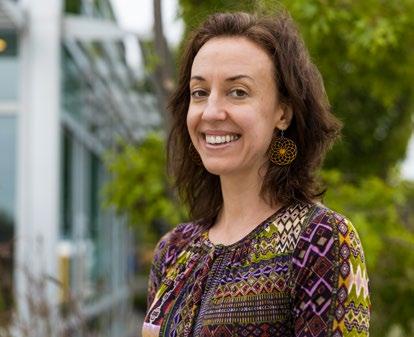
A Need for “Old-Fashioned Diligence”
For Jarislowsky Chair de Clercy, there’s unfortunately “no special trick” to fix disinformation and the decreasing levels of trust in public institutions and leaders.
Although a 2024 survey by the Organization for Economic Cooperation and Development Canada shows that Canada still has relatively high levels of trust in its institutions and leaders, compared to other countries, the levels are indeed declining.
“As a researcher, I know the concept of trust is very complicated and builds slowly, so it could take years for higher levels of trust to return in Canadian politics,” Prof. de Clercy says. To address this issue, she says governments need to focus on effective communication and ensuring diversity in leadership so all citizens can see themselves reflected in politics and trust that their leaders are acting in their best interest.
Academically, she notes that all post-secondary institutions should focus on promoting critical thinking, logical reasoning, and regularly reviewing diverse news sources to create well-informed citizens.
“In the fight to retain and bolster democracy, we don’t know what the future will bring,” Prof. de Clercy says. “But, while they may not be flashy or sexy, we do have the tools to solve this problem. It just takes time and old-fashioned diligence.”





